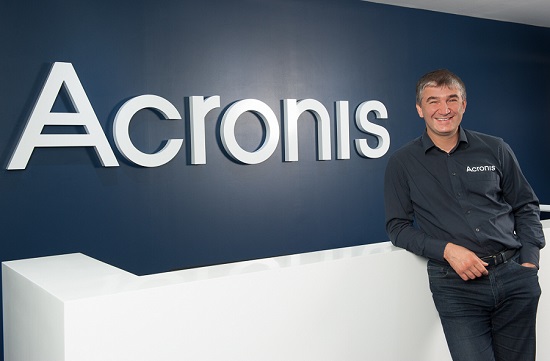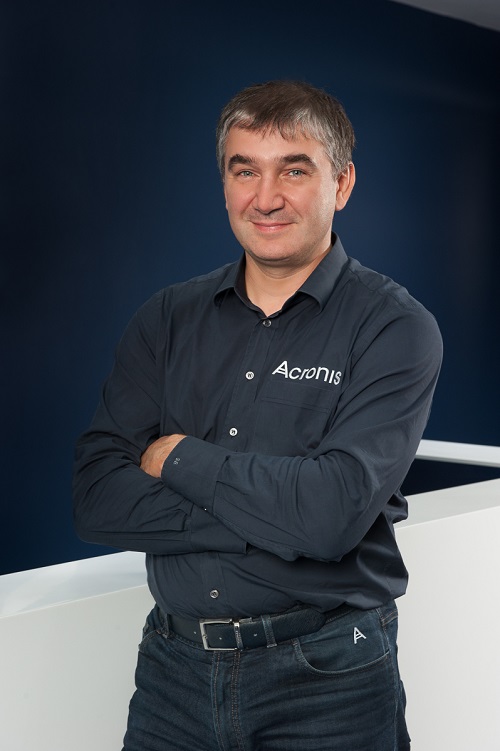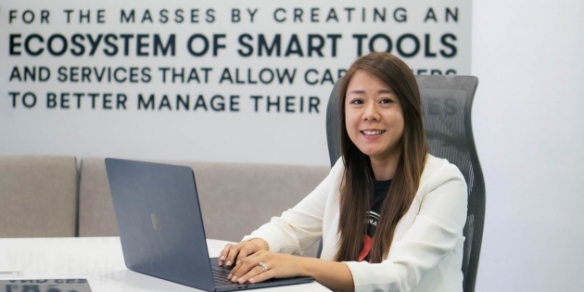The incredible strangeness of being Serguei Beloussov
By A. Asohan March 11, 2015
- Science geek turned entrepreneur believes science and making money are fun
- An unusual response to that usual question: Who is your role model?

HE walks into the room clad in black denims and a dark shirt, a laptop bag strapped to his back, shooting forth a staccato stream of comments and observations, as well as instructions to his team, immediately communicating a simple fact: He’s the boss.
A forceful personality and a keen intelligence may conjure images of tech founders like Apple’s Steve Jobs and Oracle’s Larry Ellison, but Acronis chief executive officer Serguei Beloussov’s ‘boss effect’ is also tempered by the good-natured banter that takes place between him and his staff.
You figure he’s a man used to getting his way and with little patience for tardiness, but willing to accommodate other opinions too. Certainly the first part explains why, in 2013, he returned to take back the reins of the company he had founded in 2001 and which he had effectively – in terms of managing the company at least – left in 2007.
It’s a more amicable version of the Jobs story, sans boardroom shenanigans: Beloussov (pic above) knows best!
But it’s true: Sometimes you need a ‘founder personality’ to steer a successful company into an entirely new direction, just because it’s the future.
Bill Gates did that with Microsoft in 1995 with his ‘Internet Tidal Wave’ memo, dragging the company he had cofounded into the Internet age, kicking and screaming though it may have been.
For Beloussov, that future is the cloud. He and his partners founded Acronis in 2001 in Singapore as a business unit within SWsoft, a server automation and virtualisation software company and the parent company of Parallels Inc, which Beloussov also founded.
In 2002, Acronis was spun off as a separate company, its backup solutions gaining a stranglehold in the Japanese market, and were no slouch elsewhere either.
All was good, but it’s obvious that Beloussov was impatient with Acronis’ progress and growth. He came back as CEO in 2013, redirecting the company towards a ‘cloud-first’ strategy: All its solutions are being converted to cloud services, while new development will involve cloud offerings that will be later ported to on-premises products.
More importantly, he wants Acronis to become a billion-dollar company. It sold more than three million licences in 2014, but its cloud business grew by 10 times in 2014 over 2013, he says, speaking at the recent Malaysian launch of Acronis’ Backup-as-a-Service offering. (As a privately-held company, Acronis does not disclose actual revenue figures.)
He also brought Swiss-headquartered Acronis ‘back’ to Singapore, establishing its international headquarters in the island-republic. More than once, at the Malaysian launch, the Russian-born entrepreneur emphasised that he is now a Singaporean citizen.
“We’re going to have perhaps about 30% of our engineering talent in Singapore,” he says, adding that out of its 650+ employees worldwide, 330 are engineers.
“We’re primarily a technology company – we’re not even a product company,” he proudly declares.
That pride in engineering comes from Beloussov’s tech heritage. He graduated from the Moscow Institute of Physics and Technology in 1992 with a Bachelor’s in Physics, then got his Master’s in Physics and Electrical Engineering in 1995, and a PhD in Computer Science in 2007.
He remains a senior partner at Runa Capital venture fund, which amongst other areas, has invested in companies developing teleportation technologies, and executive chairman of Parallels. Before returning to Acronis, he had also cofounded Qwave Capital venture fund, created to support advanced quantum technologies.
After the Acronis Backup-as-a-Service launch event, Beloussov spoke to Digital News Asia (DNA). These are the highlights of that conversation:
DNA: You were in a good space of your life, pursuing your interests in teleportation and quantum communications. Was it a sacrifice on your part, coming back to Acronis?
 Beloussov (pic): No! There were a number of reasons why I came back to Acronis. One of them was that it is actually fun to build a multibillion-dollar software company. I’ve never done it before.
Beloussov (pic): No! There were a number of reasons why I came back to Acronis. One of them was that it is actually fun to build a multibillion-dollar software company. I’ve never done it before.
And it [cloud backup] is an open space. If you remember, 10 years ago there was Veritas, which was an up-and-coming leader [in data backup]. Then Symantec ate it, and now it is picking up … but it is already broken. So the space for a leader in storage management software is open.
[Veritas Software, founded in 1983, merged with security specialist Symantec in 2005 in a deal valued at US$13.5 billion. However, last October Symantec announced the company was splitting back into two parts.]
And it is fun to win. Also, it’s a good way to make money. That’s business.
Acronis was always about doing a good thing, being a leader, and making money. It was always business-focused, and not a ‘startup’ in that sense. Acronis was profitable from just about Day One – we were already making money in our second quarter.
It’s good to make money, and to have fun. There are different types of fun: I, for example, enjoy science. Quantum communications is not fun; it’s business. But quantum computers … now that’s fun.
Qwave invested in a company called ID Quantique (a Geneva, Switzerland-based company, in a deal worth US$5.6 million], which is a global leader in quantum communications. It makes quantum random number generators and quantum communications devices and instrumentation.
DNA: How’s that going? Do you still follow what’s going on with ID Quantique (IDQ)?
Beloussov: I am chairman of the board, and we own 40%. Yes, I follow [what’s going on in IDQ] as a board member, but I am not operationally involved. It’s a small business, but doing well. But, you know, 95% of my focus is on Acronis.
DNA: When you came back to Acronis, you said you wanted to take it from a several-hundred-million-dollar company to a multibillion-dollar company. How far are you from that target?
Beloussov: Well, I’ve only been back one-and-a-half years (chuckles). We’re quite far. It will take us four to five years. It will take us less than 10 years, I hope!
DNA: Is this CEO role permanent, as far as you can see? Have you set a personal goal for yourself – that is, once Acronis reaches a certain stage, you can leave?
Beloussov: At the moment, we have a certain strategy. And this strategy is a work in progress.
It certainly seems to be working – we grew our cloud revenue by 10 times [in 2014 over 2013], and will grow it by two or three times this year – but it is still a small part of business. Looking at the cloud architecture way of delivering solutions, we’re on a roll now, but we’re still putting the pieces together for our strategy, including getting partners and customers on board.
So I don’t really think about my personal plans in the way that the goal is to leave the company at some point. I am building the business, and there’s a roadmap, and there’s certainly a lot to do in the next two years at the least.
A lot. I don’t even think about what next after that – so many countries, so many partners, so many products to build.
DNA: You said you intend to make the cloud a substantial part of your business. What’s the percentage right now?
Beloussov: It’s probably going to be about a third of the business by the end of the year, but it’s about 15% this quarter. It was almost zero in 2013. It’s a big movement, but still a small percentage. A big percentage would be when it’s about 75%.
DNA: What has been the biggest challenge in redirecting the company towards the cloud? Was it a people management challenge? An engineering challenge? A business challenge?
Beloussov: In a way, this challenge with Acronis is quite a unique challenge because most of the time, you start a business with some specific idea, and you grow the business around that line … up to a limit.
But it’s a business that you grow from the ground-up – and this whole thing about coming back, and re-growing the business, is quite a different experience.
And if you look at the technology world specifically, you have two types of people: You have professional managers, and you have entrepreneurs. Entrepreneurs rarely go back, so for me, it’s quite a different experience, to go back to the business and try to grow it differently.
The main challenge? Acronis has 658 people now, and about 170 contract workers full-time. It is still a small business, but surprisingly, even for such a small business, there can be a lot of inertia, and so to move it from one model to another is quite difficult.
Before I came back, I was with Parallels, and I would look at Microsoft and judge [former CEO] Steve Ballmer.
But now that I’m back at Acronis, I totally understand how difficult it is to turn a company. Turning Microsoft? I think Ballmer did an incredible job for the company. It’s amazing, if you see how much profit he generated, and how he sustained the business through so many challenges. [Ballmer resigned and was replaced by current CEO Satya Nadella last February.]
Of course, what Steve Jobs has done [at Apple] is an even more amazing job, but you know, Steve Jobs is very much unique.
DNA: So you were surprised at the inertia you found at Acronis, but are you satisfied with the progress Acronis as a company, or its people, have made in meeting the needs of the new cloud business model?
Beloussov: I’ve spent almost half of my business life in Asia, but I was born, raised and educated in Russia, and Russians are a very negative people – so I’m always never satisfied with what is done.
Am I satisfied with the progress? Well, no. There’s been a lot of progress, but it depends on how you measure it, doesn’t it?
I mean, if you measure it from the standpoint of, ‘Is Acronis a good company?’ Yes, it’s a profitable company, with good products, and we’re helping customers and partners. But could it have been 10 times larger by now? Yes, it could have been.
So it’s not clear whether we can be satisfied. I’m not sure if we could ever be satisfied.
I think we’ve made very good progress, and I think the next 12 months are going to be very, very exciting months, honestly – because of all the products we’re rolling out. We have Backup-as-a-Service, Disaster Recovery-as-a-Service just rolling out, and [secure] Access-as-a-Service.
In 12 months, it’s going to be very, very different.
DNA: Talking about Acronis’ plans, you spoke about hot data [data that is being constantly written and read], cold data [archived data which you never touch], and e-discovery. Can you explain them?
Beloussov: I think about it this way: Really, why do people need to do backup? It’s because storage systems are shit. A good storage system doesn’t lose data, and should do backup automatically.
Unfortunately, the world is organised in such a way that there are storage vendors, and backup vendors, and systems vendors, and operating systems vendors – they all do their thing, but none of them are properly taking care of backup.
If you look at Veritas in the past, it was about giving data to Veritas, and it is safe. In order to do that, it [Veritas] had to be a storage vendor.
We want to do that, but in the cloud world. You give us the data, it’s safe. You never lose data, you never lose the system. Your data is safe with Acronis.
That’s what we want to do. It’s a very complex value proposition.
DNA: You now have a cloud-first strategy in terms of both development and the business. Is it easier to develop something on the cloud and then bring it on-premises, or vice versa?
Beloussov: It’s not so much of whether it is easier or not, but the cloud architecture is the new development paradigm that is more suited to the world today – where IT is very widely used, whether at home or in business.
I still think that at the end of the day, the cloud model – not just the architecture, but the cloud business model, and cloud service providers – is also the right way for IT to go, for most uses. There is an inherent concern about privacy, but that concern is mostly artificial.
DNA: How do you mean?
Beloussov: When you think about privacy, you should think about bits. Where is the bit? Is it on the screen? No, it’s not on the screen. Is it inside the device, on some chip? Is it there physically? What’s the difference if it is there physically, or if it is not there physically, but it is there in some data centre which you can reach? Is it more safe because it is with you? Because it is in your office? Or because it is in the cloud?
My view is that it’s safe because it is in the cloud. It has to be local, sort of like the banking system – you need to have a bank, which is local, and which you can go to. This bank may have many branches, but it is local with a presence in the country, and you don’t have to carry the money with you all the time. You just send those bits.
So privacy and security, in most cases, are better served by data being in the cloud rather than being in your own device.
DNA: In your career, you have met people like Bill Gates and Steve Jobs, many luminaries and famous people in the tech industry. But who is your role model?
Beloussov: I don’t have a role model. [Pauses for some time]. Not really. Honestly, I don’t.
The closest is perhaps Steve (Jobs), but he cannot be a role model because he had very unique qualities – very unique good sides which were always combined with very unique bad sides. It’s impossible to replicate. Bill Gates, as well.
I don’t think you can have a role model. I’m not religious, but one part of religion which I enjoy is that there is only role model, and it’s God.
And you know, you can have a god as the god of a certain religion, or you can have a god as a sort of absolute knowledge. But humans? We cannot be role models.
Related Stories:
‘In the future, there’ll be no money … only data’
Sci-fi visions and today’s problems
The Ballmer hate: In the end, he was only human
The colourful life of Larry Ellison, and his resignation
For more technology news and the latest updates, follow us on Twitter, LinkedIn or Like us on Facebook.


